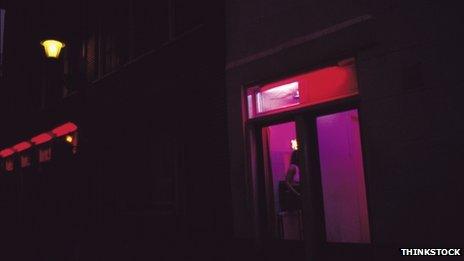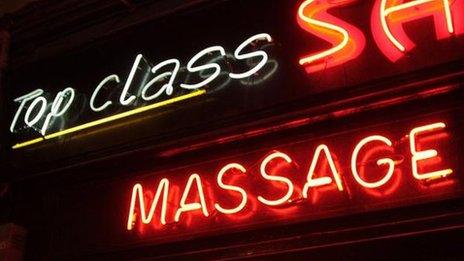London 2012: Will the Olympics bring more prostitutes?
- Published

Major sporting events such as World Cups and Olympic Games are often preceded by warnings about a rise in prostitution and sex trafficking as a result of the impending influx of spectators. But will prostitution in London really increase because of the 2012 Olympics?
It seems like every time a World Cup or an Olympics appears on the horizon, so do warnings from the international press, government ministers and police.
They all express fears that thousands of women will be trafficked to the host nation to satisfy the sexual desires of the crowds.
The same messages <link> <caption>have long been issued for the London 2012 Olympic Games.</caption> <url href="http://news.bbc.co.uk/1/hi/england/london/8150364.stm" platform="highweb"/> </link>
In January 2010 <link> <caption>Tessa Jowell, then Minister for the Olympics in the previous government, told MPs:</caption> <url href="http://www.theyworkforyou.com/wrans/?id=2010-01-26b.312016.h" platform="highweb"/> </link> "Major sporting events can be a magnet for the global sex and trafficking industry; this is wholly unacceptable. I am determined that traffickers will not exploit London 2012."
And Dennis Hof, who owns the Moonlite Bunny Ranch, a large-scale brothel in Nevada, US, <link> <caption>says he expects London to see</caption> <url href="http://abcnews.go.com/Blotter/make-brothels-legal-london-olympics-dennis-hof/story?id=16372338" platform="highweb"/> </link> "1,000 girls to be trafficked in by South East Asian, Albanian and African gangs, violent gangs involved in crime and drugs".
Hof, who wants to run a legal brothel during the Olympics, bases his prediction on what he said he saw at the 2010 Winter Olympics in Vancouver, Canada.
But are such warnings accurate?
The 2004 Olympic Games in Athens seems to be the first major international sporting event to have invoked widespread warnings about a rise in prostitutes and sex workers. <link> <caption>It is often reported to have seen its sex trafficking almost doubling.</caption> <url href="http://www.thefuturegroup.org/id50.html" platform="highweb"/> </link>
However, <link> <caption>a report by the Global Alliance Against Traffic in Women (GAATW)</caption> <url href="http://www.gaatw.org/publications/WhatstheCostofaRumour.11.15.2011.pdf" platform="highweb"/> </link> shows the number of cases in Athens during the whole of 2004 was 181, up from 93 in 2003 - a far cry from the many thousands of women said to be threatened by trafficking in these situations.
None of these 181 cases were linked to the Games by Greek authorities.
Prior to the 2006 World Cup in Germany, similar warnings were issued by media and various officials, <link> <caption>but according to an EU report from January 2007,</caption> <url href="http://register.consilium.europa.eu/pdf/en/07/st05/st05006-re01.en07.pdf" platform="highweb"/> </link> the German government only found five cases of trafficking cases linked to the tournament.
The report also states that "the increase in forced prostitution and human trafficking for the purpose of sexual exploitation during the 2006 World Cup in Germany which was feared by some did not materialise" with "no sign whatsoever of the alleged 40,000 prostitutes/forced prostitutes - a figure repeatedly reported, also in international media".
And yet, the 2006 World Cup <link> <caption> has been used as an example</caption> <url href="http://news.bbc.co.uk/1/hi/england/dorset/7884456.stm" platform="highweb"/> </link> of an instance where huge numbers of prostitutes were paid for sex by large numbers of the tournament attendees.
Sticking with World Cups, <link> <caption>a study funded by the United Nations Population Fund and conducted after the 2010 tournament in South Africa</caption> <url href="http://www.plosone.org/article/info%3Adoi%2F10.1371%2Fjournal.pone.0028363#top" platform="highweb"/> </link> found there was no significant change in the numbers of men visiting prostitutes during that event.
But there had been broad speculation that between 40,000 and 100,000 sex workers from all over the world would enter South Africa because of that tournament.
The 2010 Olympic and Paralympic Winter Games, held in Vancouver, Canada were also subject to similar speculation - but according to <link> <caption>a study conducted afterwards by University of British Columbia researchers,</caption> <url href="http://sti.bmj.com/content/88/4/301.abstract" platform="highweb"/> </link> mass trafficking didn't happen there, either.
The study says that "despite sensationalised media coverage" prior to the Games, there was "no evidence in this study to support concerns of an influx of sex workers or reports of trafficking of women or girls".
Many have used the experiences of the Greeks, Germans and South Africans to form an argument that London will have to brace itself for increased numbers of sex workers.

But more than two years later, Tessa Jowell, who once told the Commons about her determination to combat sex trafficking at London 2012, now admits that "current intelligence would suggest that we are unlikely to see large scale trafficking into London as a result of the Games".
"There is some anecdotal evidence to suggest that international sporting events might create demand for paid sex due to the influx of tourists, site workers, contractors, the media and indeed the athletes themselves - although this is contested."
Jowell also says that it is "hard to know" whether the lack of evidence for Games-related trafficking "was a result of the measures that were put in place" by her officials "or whether the threat simply hasn't materialised".
"We would certainly rather be having a conversation about whether the threat of trafficking was ever going to materialise rather than about it as a reality on the streets of London and we should continue to be vigilant in the face of such a threat."
The Metropolitan Police Service's Human Exploitation and Organised Crime Command (SCD9) was set up at the start of 2010 to tackle vice, human trafficking and immigration crime. It has a team focusing on vice-related crime in the five Olympic host boroughs - Newham, Hackney, Waltham Forest, Tower Hamlets and Greenwich.

<link> <caption>SCD9 was given £600,000</caption> <url href="http://www.mpa.gov.uk/committees/mpa/2010/100128/07/" platform="highweb"/> </link> to tackle the potential increase in trafficking in those five boroughs in the run up to 2012.
<link> <caption>However, a Met Police Authority report on SCD9 published in October 2011</caption> <url href="http://www.mpa.gov.uk/committees/sop/2011/1110/08/" platform="highweb"/> </link> said the "intelligence currently held does not support any increase in prostitution in the Olympic Boroughs and actually shows a decrease in some locations".
And a Met Police spokesman says SCD9 was set up "based on assessments made over three years ago" which had used "the best information available" at that time. "As time has moved on we have not seen any rise in trafficking linked with the Olympics," he adds.
Conservative London Assembly Member Andrew Boff <link> <caption>has compiled the Silence of Violence report</caption> <url href="http://glaconservatives.co.uk/wp-content/uploads/downloads/2012/03/Report-on-the-Safety-of-Sex-Workers-Silence-on-Violence.pdf" platform="highweb"/> </link> which also says there is "no strong evidence that trafficking for sexual exploitation does in fact increase during sporting events".
He also says raids on brothels were increasing as the Olympics approached, with 80 being closed in the Olympic borough of Newham in the last 20 months or so.
Sarah Walker, of the English Collective of Prostitutes, echoes this view, saying recent frequent police raids on east London brothels represent a pre-Olympics crackdown - about which the ECP is "outraged".
However, the Met Police denied conducting any crackdown, saying it has "not increased operations targeting brothels in the five Olympic boroughs" and was "responding to local concerns and feedback from residents and businesses across London about street prostitution".
Another group representing sex workers, x:talk, is calling for a <link> <caption>moratorium on arrests, the detention and deportation of sex workers</caption> <url href="http://www.moratorium2012.org/" platform="highweb"/> </link> until the end of the Olympics.
A spokeswoman also says police raids on brothels, particularly in east London, are driving sex workers further away from their support network of co-workers and health services, prompting the call for a pause on arrests.
"Ultimately, arresting these women and raiding their places of work just makes them more vulnerable," she says.